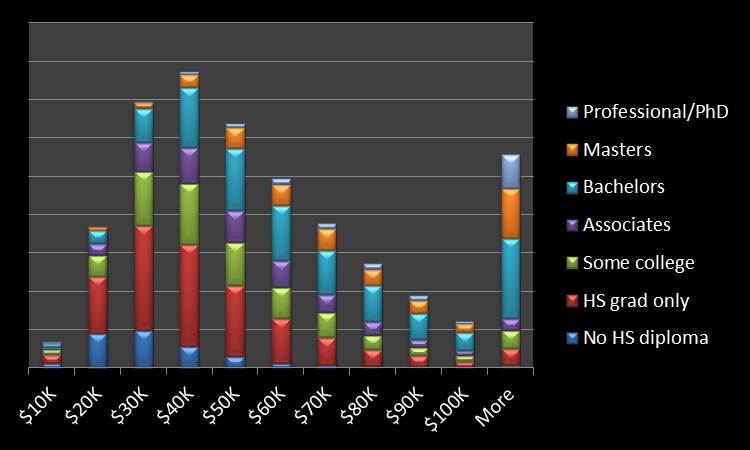
Last month The New York Times covered the release of a two reports designed to create a sense of urgency on the issue of college completion. Featured prominently in the conclusion of one of the reports, American Dream 2.0, was the following quote from a well-known college president:
"Anyone who does not get a college credential will never escape the cycle of poverty."
No college = terrible life. Perhaps he meant it as a simple rallying cry to the college-going cause and not as a literal truth. (Surely he knows that more than half of Americans don't have a college degree and they are not all in poverty). Or maybe he meant that for the unfortunate who are struggling, getting a college degree would be a useful ticket out. Whatever his intent, the quote was stirring in my head so much that I woke up at 4:30 in the morning thinking about it. Unable to get back to sleep, I went to my computer to check the Census Bureau data on earnings by education level.
Here's what I found. It is true that the average full-time worker (age 25-64) with a bachelor's degree earns $30,000 more than the full-time worker with only a high school diploma ($72,000 compared to $42,000). That big gap, summed up over a working lifetime, is the derivation of the (somewhat misleading) "million dollars more" call to action used by nearly every high school counselor in the country.
But these are averages, not individuals. If as marketers we keep throwing only these numbers at the target high school students, they will quickly discover the tails of the distribution: some people who don't have college degrees (er, credentials) actually have nice cars, boats, and vacations; and some people with degrees are struggling. There goes our credibility; message undermined.
The graph below is a less simplistic approach we might take to showing the money-education relationship.

When I tested this alternative approach on a group of high school educators, they were drawn in, wanting to study it and discuss it. The chart does confirm the strong relationship between education and earnings: the high school diploma color is bunched on the left, while the professional degrees (mostly lawyers and doctors) are on the right (but much smaller numbers). Those with bachelor's degrees are spread pretty broadly, but do fairly well in the highest category.
At the same time it shows that while education improves the odds of a higher income, it is no guarantee. Likewise, the lack of a degree does not necessarily sentence you to the poorhouse. In fact, a small but not inconsequential number of those with only a high school diploma make a pretty good living. (One caveat: these data are working adults only, so students should also review the unemployment figures by education level.)
We college advocates have succeeded in making the case for college. Every family feels the urgency, and schools are focused (or know they should be) on getting students ready. Maybe we can now ease back on the simplistic messaging and offer up, as an educational exercise, somewhat more complex but more accurate information. I suspect our high school students will appreciate it, learn from it, and may ultimately be more compelled by it. And for those who don't go to college, they will know that they need to work extra hard to get into the right-hand portion of the graph.